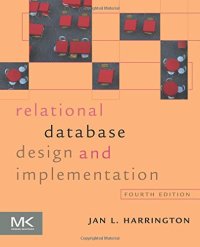
Ebook: Relational Database Design and Implementation
Author: Jan L. Harrington
- Tags: Management Information Systems, Business Technology, Computers & Technology, Data Mining, Databases & Big Data, Computers & Technology, Data Processing, Databases & Big Data, Computers & Technology, Library Management, Library & Information Science, Social Sciences, Politics & Social Sciences, Database Storage & Design, Computer Science, New Used & Rental Textbooks, Specialty Boutique
- Year: 2016
- Publisher: Morgan Kaufmann
- Edition: 4
- Language: English
- pdf
Relational Database Design and Implementation: Clearly Explained, Fourth Edition, provides the conceptual and practical information necessary to develop a database design and management scheme that ensures data accuracy and user satisfaction while optimizing performance.
Database systems underlie the large majority of business information systems. Most of those in use today are based on the relational data model, a way of representing data and data relationships using only two-dimensional tables. This book covers relational database theory as well as providing a solid introduction to SQL, the international standard for the relational database data manipulation language.
The book begins by reviewing basic concepts of databases and database design, then turns to creating, populating, and retrieving data using SQL. Topics such as the relational data model, normalization, data entities, and Codd's Rules (and why they are important) are covered clearly and concisely. In addition, the book looks at the impact of big data on relational databases and the option of using NoSQL databases for that purpose.
- Features updated and expanded coverage of SQL and new material on big data, cloud computing, and object-relational databases
- Presents design approaches that ensure data accuracy and consistency and help boost performance
- Includes three case studies, each illustrating a different database design challenge
- Reviews the basic concepts of databases and database design, then turns to creating, populating, and retrieving data using SQL